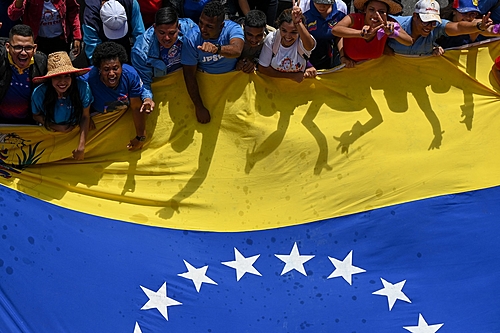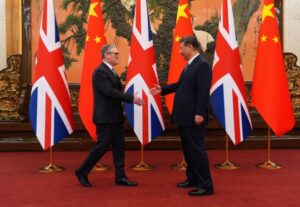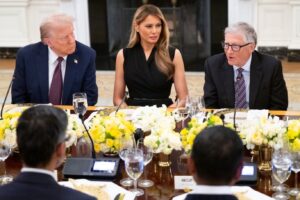
Venezuela has already entered into an atmosphere of electoral dispute even a year before the next elections, which should take place in 2024, but which still do not have a defined date. This is because in recent months the parties have taken to the streets with political acts, candidates have publicly provoked each other and opponents have been attacking the president to present themselves as an alternative to the government.
The opposition scenario, however, is still fragmented and far from achieving the intended cohesion. The main sector of the right is united in the Unitarian Platform coalition and has called primary elections to try to define a single candidate who will face Chavismo in the next election.
Among the 14 candidates for the position of opposition representative are old names in Venezuelan politics who have already been involved in several attempts to confront the government, either through elections or even through insurrection. The favorite in the polls so far is former congresswoman Maria Corina Machado, an extreme right-wing ultraliberal who came to defend foreign military interventions against Venezuela.
In addition, Henrique Capriles, former governor of Miranda state and former presidential candidate twice, is also trying to assert himself as an opposition leader. Despite not appearing well positioned in the polls, he is betting on his experience as a candidate to convince supporters, since he lost to Nicolás Maduro, in 2013, by a narrow margin of votes.
::What’s happening in Venezuela::
Another name that appears with some relevance in the process is former deputy Freddy Superlano, who even defeated the Chavista candidate in the elections for the government of the State of Barinas in 2021, but was disqualified by the Justice from taking office. In the past, Superlano held strategic positions in the so-called “interim government” and today he is leader of Voluntad Popular, the same party as the former deputy who proclaimed himself president Juan Guaidó.
These three candidates have something in common: they are disqualified by the Comptroller General of the Republic from holding public office. Maria Corina has a ban for 15 years because, according to the authorities, she would have hidden assets in her declaration of assets during the period that she was a deputy. Capriles also has a 15-year disqualification for various alleged administrative offenses he allegedly committed during his tenure as governor of the state of Miranda (2008-2017).
Running on the outside and not yet announcing whether or not he will be a candidate, the current governor of the state of Zulia, Manuel Rosales, could also be another important player in the dispute. A historic opponent of Chavismo, Rosales was a presidential candidate in 2006 and lost to former president Hugo Chávez. In 2009, he was accused of corruption and fled the country, returning in 2015, where he was jailed for two months. At the time, he was disqualified from holding public office for seven years, but in 2017 the Superior Court of Justice (TSJ) accepted an appeal and annulled the decision.
::Venezuela: CNE director linked to the opposition resigns after right-wing withdraws support for primaries::
The possibility of running for President makes Rosales a possible candidate for unity, if the other sectors fail to negotiate an end to the disqualifications. However, Zulia’s governor and his party, Un Nuevo Tiempo (UNT), have already announced and withdrawn their participation in the primaries twice since the beginning of the process and Rosales’ presence remains unknown.
Sanctions, calendar and dialogues
Disqualification of opponents should become one more element of negotiation at dialogue tables between the government and the opposition. Talks, which have been taking place in Mexico and have been paralyzed since 2021, will be decisive in defining not only the dates of the next presidential election, but also the electoral conditions for the government and the opposition.
With its main candidates disqualified, the right calls for the creation of an electoral calendar and legal guarantees so that everyone can compete. The government, already worn out by the economic crisis aggravated by the US blockade, demands the suspension of sanctions so that the country can hold elections without external interference.
“The government says it also needs electoral conditions, and what are they? Arriving at elections without sanctions”, explains Indira Urbaneja, political analyst, director of the NGO Reunificados and specialist in electoral campaigns. An opponent of chavismo, she explains to the Brazil in Fact that negotiating the end of the blockade before the presidential election is essential for the government to be able to resume projects and public policies that recover the country’s economy.
::Lula compares Venezuelan opposition to Bolsonaro and says the country has more elections than Brazil::
“So the government says: ‘How am I going to the elections in this scenario if I can’t guarantee my electorate the social and economic conditions for people to want to vote for me, for people to be interested in my electoral offer’?”, he explains.
Urbaneja, however, also claims that the existence of sanctions ended up harming the very opposition candidates who asked for the blockade, as voters began to identify the relationship between the economic crisis and the restrictive measures imposed by the US.
“There is a large sector of the Venezuelan population that does not identify with either the opposition or Chavismo, and that does not mean that they are not willing to vote for these sectors. In fact, these voters are saddened, disappointed, and they also blame the opposition. So this game ended very badly for the opposition because they believed that the population would not realize that they are also responsible for the socioeconomic situation we are experiencing,” he says.

Machado, Capriles, Maduro, Superlano and Rosales are some of the main figures in the dispute / Reproduction
In the last week, the dialogues between government and opposition gained a new incentive. On the sidelines of the Celac-UE summit, the vice-president of Venezuela, Delcy Rodríguez, met with the head of the opposition delegation in the talks, Gerardo Blyde. The meeting was also attended by the presidents of France (Emmanuel Macron), Colombia (Gustavo Petro), Argentina (Alberto Fernández) and Brazil (Lula).
::The end of Guaidó’s ‘presidency’ reflects the exhaustion and crisis of the right wing in Venezuela::
After the meeting, Venezuelan President Nicolás Maduro celebrated the meeting and said that “there was a consensus” to eliminate sanctions against Venezuela. For Gustavo Borges, researcher at the Samuel Robinson Institute of Venezuelan foreign policy, lifting the US blockade is necessary to balance next year’s electoral dispute.
“This whole scheme of aggression and asphyxiation makes it impossible for a process under equal conditions to be possible because the opposition sector supports and promotes the sanctions campaign and, therefore, is part of it. What is being tried to negotiate in Mexico is the end of the sanctions policy and joint agreements to regularize the situation in the country, even after the elections”, he says to the Brazil in Fact.
Borges still considers that “the best scenario would be one in which no one is disabled, but this process is vitiated by pressure, aggression, permanent threat and the imposition of hostile measures by foreign powers against the country”.
Who against whom?
Faced with the diversity of pending issues in the negotiations, the possibility of visualizing the candidates for the next election is even more distant. On the opposing side, if the polls are confirmed and if the primaries take place, Maria Corina Machado would be the favorite, even if she is disqualified.
The former deputy, however, says she does not recognize the processes of dialogue between the government and the opposition and has been increasingly raising the tone of her electoral campaign. One of her slogans is that she will go “until the end” to, in her words, “overthrow the regime” of Maduro and “sweep away socialism” from Venezuela.
On the other hand, she says that her candidacy is based on “order, money and family” and brings ultraliberal proposals for the economy such as the privatization of almost all public goods and services, including the oil industry, which is the main source of income for the Venezuelan state.
::Lula is right when he speaks of ‘narrative’ against Venezuela, says Venezuelan researcher::
For Gustavo Borges, there is a false perception of Machado’s growing popularity since, in fact, he would be winning over former supporters of Juan Guaidó. “The narrative that Maria Corina is mobilizing new voters, new supporters, who is growing exponentially is false. She simply filled a vacuum left by Juan Guaidó, so these supporters are changing the party’s shirt and that is why they begin to see in her the possibility of continuing with this radical right-wing project”, he says.
Analyst Indira Urbaneja goes further and claims that Maria Corina has no intention of winning the elections. “She wants to be head of the opposition to say that there are no electoral conditions here, that ‘in a dictatorship you don’t vote’, so she wants to say: ‘as in a dictatorship you don’t vote, I need the international community to support me, because I do have the courage that Guaidó didn’t have to activate the TIAR [Tratado Interamericano de Assistência Recíproca]or activating R2P, which is the Responsibility to Protect convention, and the commitment and courage to accept that marines Americans intervene in Venezuela’, that’s her plan,” he says.
::’Brazil will become Venezuela’: what’s behind the right-wing slogan that’s still alive::
On the government side, the most likely and expected by analysts is that Maduro will run for re-election and try for the 3rd consecutive term. Despite still facing a complex economic scenario with one of the highest inflation rates in the region, Chavista is betting on lifting sanctions to increase oil income and invest in the country’s recovery.
Urbaneja, however, points to the possibility of a failure in Maduro’s strategy and claims that if Chavismo realizes that the current president may not be able to win the elections, another candidate should be studied.
“To this day, Maduro is recognized by his base as the man who saved the country from attacks by the US, out of 59 countries that recognized the interim term and sanctioned Venezuela. Maduro stayed there, resisting and that has value for voters, but politics is also pragmatic and if Chavismo notices that Maduro cannot guarantee victory, I am convinced that they could find another candidate. It is not something that is given now, I do not see it that way, but we cannot rule it out either,” she says.
Editing: Thales Schmidt
Source: www.brasildefato.com.br

